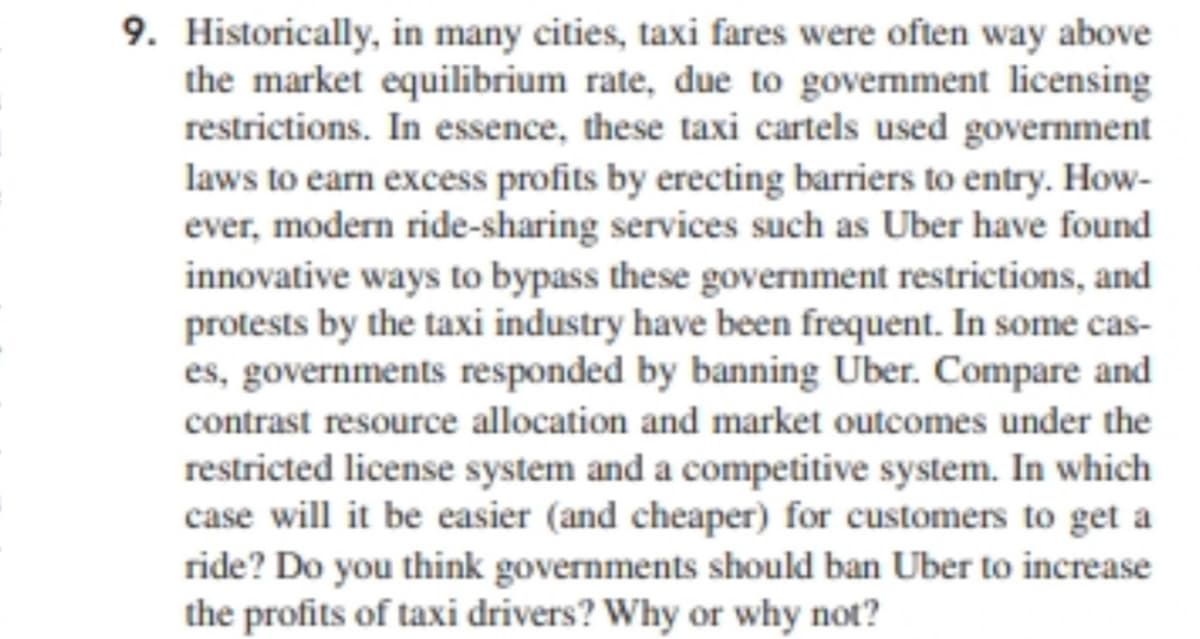9. Historically, in many cities, taxi fares were often way above the market equilibrium rate, due to government licensing restrictions. In essence, these taxi cartels used government laws to earn excess profits by erecting barriers to entry. How- ever, modern ride-sharing services such as Uber have found innovative ways to bypass these government restrictions, and protests by the taxi industry have been frequent. In some cas- es, governments responded by banning Uber. Compare and contrast resource allocation and market outcomes under the restricted license system and a competitive system. In which case will it be easier (and cheaper) for customers to get a ride? Do you think governments should ban Uber to increase the profits of taxi drivers? Why or why not?
9. Historically, in many cities, taxi fares were often way above the market equilibrium rate, due to government licensing restrictions. In essence, these taxi cartels used government laws to earn excess profits by erecting barriers to entry. How- ever, modern ride-sharing services such as Uber have found innovative ways to bypass these government restrictions, and protests by the taxi industry have been frequent. In some cas- es, governments responded by banning Uber. Compare and contrast resource allocation and market outcomes under the restricted license system and a competitive system. In which case will it be easier (and cheaper) for customers to get a ride? Do you think governments should ban Uber to increase the profits of taxi drivers? Why or why not?
Economics: Private and Public Choice (MindTap Course List)
16th Edition
ISBN:9781305506725
Author:James D. Gwartney, Richard L. Stroup, Russell S. Sobel, David A. Macpherson
Publisher:James D. Gwartney, Richard L. Stroup, Russell S. Sobel, David A. Macpherson
Chapter24: Price-searcher Markets With High Entry Barriers
Section: Chapter Questions
Problem 9CQ
Question

Transcribed Image Text:9. Historically, in many cities, taxi fares were often way above
the market equilibrium rate, due to government licensing
restrictions. In essence, these taxi cartels used government
laws to earn excess profits by erecting barriers to entry. How-
ever, modern ride-sharing services such as Uber have found
innovative ways to bypass these government restrictions, and
protests by the taxi industry have been frequent. In some cas-
es, governments responded by banning Uber. Compare and
contrast resource allocation and market outcomes under the
restricted license system and a competitive system. In which
case will it be easier (and cheaper) for customers to get a
ride? Do you think governments should ban Uber to increase
the profits of taxi drivers? Why or why not?
Expert Solution
This question has been solved!
Explore an expertly crafted, step-by-step solution for a thorough understanding of key concepts.
This is a popular solution!
Trending now
This is a popular solution!
Step by step
Solved in 2 steps

Recommended textbooks for you

Economics: Private and Public Choice (MindTap Cou…
Economics
ISBN:
9781305506725
Author:
James D. Gwartney, Richard L. Stroup, Russell S. Sobel, David A. Macpherson
Publisher:
Cengage Learning

Microeconomics: Private and Public Choice (MindTa…
Economics
ISBN:
9781305506893
Author:
James D. Gwartney, Richard L. Stroup, Russell S. Sobel, David A. Macpherson
Publisher:
Cengage Learning

Principles of Economics 2e
Economics
ISBN:
9781947172364
Author:
Steven A. Greenlaw; David Shapiro
Publisher:
OpenStax

Economics: Private and Public Choice (MindTap Cou…
Economics
ISBN:
9781305506725
Author:
James D. Gwartney, Richard L. Stroup, Russell S. Sobel, David A. Macpherson
Publisher:
Cengage Learning

Microeconomics: Private and Public Choice (MindTa…
Economics
ISBN:
9781305506893
Author:
James D. Gwartney, Richard L. Stroup, Russell S. Sobel, David A. Macpherson
Publisher:
Cengage Learning

Principles of Economics 2e
Economics
ISBN:
9781947172364
Author:
Steven A. Greenlaw; David Shapiro
Publisher:
OpenStax

Economics (MindTap Course List)
Economics
ISBN:
9781337617383
Author:
Roger A. Arnold
Publisher:
Cengage Learning


Principles of Economics, 7th Edition (MindTap Cou…
Economics
ISBN:
9781285165875
Author:
N. Gregory Mankiw
Publisher:
Cengage Learning